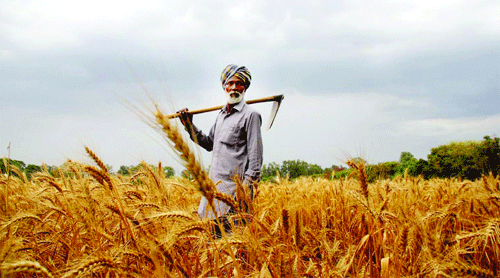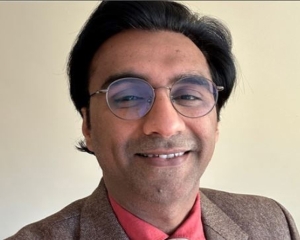The US was perhaps the first country to see the rise of agri-businesses, which now wield enormous market power. Other developing countries, including India, too have followed suit. But they must learn lessons
A prominent international daily carried a full-page advertisement last week with a bold headline stating ‘How hard can it be to feed 8.5 billion people in 2030IJ’ This page was bought by the Global Agri-business Alliance, which it was explained involved over 35 agri-businesses and an alliance which was growing. Their mission was stated as being “to tackle the issues that jeopardise the future of millions of people around the world”, and this was elaborated on to include food security, water security and climate change.
The US was perhaps the first country to see the rise of agri-businesses, which now wield enormous market power, not just in that country but worldwide, but now other countries too have followed the suit. Concurrently, farms have also grown in size, and there is no place for small farmers in many economies, given the evolution of technology and mechanisation in agriculture, and the growth of industrial activity with employment in other sectors.
To some extent, similar trends are in evidence in India, and it would not be long before global agri-businesses will find ways of encroaching on the Indian agricultural sector in a big way, which given the size of the population engaged in this sector, is in for major social upheaval as a result. India has as much of a stake in preventing the growth of unhealthy market power being assumed by agri-businesses at the global level as it has within this country, simply because as time passes, global trends will make inroads into India as well.
In material terms, however, India can do little to curb developments in other countries, but there is need to utilise every forum to raise the concerns of the small farmer in India, Africa, Indonesia and even China. It is also the responsibility of the Indian media to study global developments which have the potential of causing harm to the welfare of small farmers in India and their counterparts elsewhere who similarly lack political or economic clout.
One particular development in this field which has aroused considerable concern worldwide and has triggered a fierce debate on its implications is the $66 billion takeover of Monsanto by Bayer. It is reported that the chief executive of Bayer has been stating in various interviews that this merger is nothing less in importance than saving the world. It is claimed that by improving agricultural yields, the combined company would meet the challenge of feeding a world population that is expected to grow by three billion by 2050.
It is claimed that the new giant company would be a one-stop shop offering seeds, crop sprays, digital solutions and advice to farmers across the globe. In Europe, in particular, it is Monsanto, which is seen as the undesirable part of this merger. In most of Europe, and in Germany, in particular, Monsanto is seen as the company identified solely with genetically modified seeds and crops — ‘Frankenfoods’, a term derived from Frankenstein.
Solutions developed by the merged juggernaut would be marketed and pushed down the throats of farmers across the globe, without regard for dietary preferences, the benefits of maintaining diversity and the needs of the small farmer, which may be at considerable variance with the interests of large landholders. In fact, large farmers too are concerned about this new development which is taking place against the backdrop of serious financial distress being faced even in the US. A particular farmer from Kentucky, interviewed by the media, estimated that his profit this year would vanish due to falling crop prices and rising costs of seeds and other material.
Farmers across the US are facing the impacts of the global downturn in agricultural product prices. Since they are saddled with a surplus in production, they are forced to slash prices in order to sell their produce. Financial distress is the major cause of farmer suicides in India, often exacerbated by prolonged drought or unseasonal rainfall. The impacts of climate change in the future would be manifest in the form of drought and extreme precipitation events in several parts of the world. These phenomena would have very special local characteristics, and solutions cannot be implemented with a one size fits all approach. While it is claimed that the new entity would be able to invest larger resources in research, it would not be optimal for a large company to spread itself into R&D activities specific to a diverse set of local conditions across the globe. It is for this reason that India set up the Indian Council of Agricultural Research (ICAR) under the leadership of BP Pal as its first Director General. An extensive network was established to assess local problems and priorities with specific focus on the needs of the small farmer, and the ICAR’s extension services performed remarkable service in the initial period, which is how the Green Revolution came about. But in future, with the power of multinational agri-businesses and decline in the innovative capacity of the ICAR system, the needs of small farmers would likely remain unmet.
In a globalised world, and with billions more mouths to feed, innovation in agriculture would have to be carried out extensively in every part of the globe. But improvements would have to focus on organic methods, the reduction in use of chemical fertilisers and pesticides, efficient use of water and improved soil management. Such an approach would require significant involvement of the farmer himself, which given the dispersed nature of agricultural activities, would require public sector orientation.
Inputs from private enterprise would have to come at the demand of the public sector, and not at the behest of private interests. This is an area in which the major developing countries must take the lead in their own countries and at the same time shape public opinion in the developed world as well. The stakes are so high that if the interests of hundreds of millions of small farmers in the developing world are to be protected then a passive approach would be out of place.
(The writer is former chairman, TERI)

























